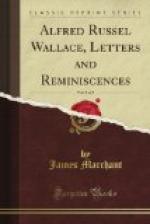It is perhaps unprofitable to go further than in previous chapters into his so-called heresies—political, scientific or religious. Yet we may imitate his boldness and ask whether he was not, perhaps, in advance of his age and whether his heresies were not shrewd anticipations of some truth at present but partially revealed. Take the example of Spiritualism, which, I suppose, has more opponents than anti-vaccination. No one can overlook the fact that Spiritualism has many scientific exponents—Myers, Crookes, Lodge, Barrett and others. Prejudices against Spiritualism are as unscientific as the credulity which swallows the mutterings of every medium. Podmore’s two ponderous volumes on the History of Spritualism are marred by an obvious anxiety to make the very least, if not the very worst, of every phenomenon alleged to be spiritualistic. That kind of deliberate and obstinate blindness which prided itself on being the clear cold light of science Wallace scorned and denounced. He did not insist upon spiritualistic manifestations shaping themselves according to his own predesigned moulds in order to be investigated. He watched for facts whatever form they assumed. He fully recognised that the phenomena he saw and heard could be easily ridiculed, but behind them he as fully believed that he came into contact with spiritual realities which remain, and which led him to other explanations of the higher faculties of man and the origin of life and consciousness than were acceptable to the materialistic followers of Haeckel, Buechner and Huxley. And who dares dogmatically to assert in the name of science and in the second decade of the twentieth century, when the deeper meanings of evolution are being revealed, and the philosophy of Bergson is spoken about on the housetops, that he was wrong? In these views may he not become the peer of Darwin?
At first blush it may seem to be a bad example of special pleading to attempt to discover the reason for his opposition to vaccination in his idealism. But it is not far from the truth. He believed in a Ministry of Public Health, that doctors should be servants of the State, and that they should be paid according as they kept people well and not ill. Health is the natural condition of the human body when it is properly sustained and used. And chemicals, even in sickness, are of less importance than fresh




